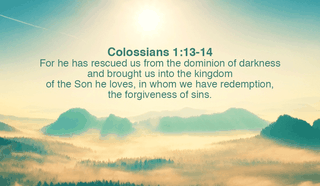
- Recent Translations
- All Translations
Colossians 1:15
Share
Settings
Colossians 1:15 Meaning and Commentary
Who is the image of the invisible God
Not of deity, though the fulness of it dwells in him; nor of himself, though he is the true God, and eternal life; nor of the Spirit, who also is God, and the Spirit of the Son; but the Father, called "God", not to the exclusion of the Son or Spirit, who are with him the one God: "and he is invisible"; not to the Son who lay in his bosom, and had perfect and infinite knowledge of him; nor, in some sense, to angels, who always behold his face, but to men: no man hath seen him corporeally with the eyes of his body, though intellectually with the eyes of the understanding, when enlightened; not in his essence and nature, which is infinite and incomprehensible, but in his works of creation, providence, and grace; nor immediately, but mediately, in and through Christ, in whom he gives the light of the knowledge of the glory of his person and perfections; and this not perfectly now, but in the other state, when the saints shall see him face to face. But chiefly the Father is said to be invisible, because he did not appear to Old Testament saints; as his voice was never heard, so his shape was never seen; he never assumed any visible form; but whenever any voice was heard, or shape seen, it was the second person that appeared, the Son of God, who is here said to be his "image", and that, as he is the Son of God; in which sense he is the natural, essential, and eternal image of his Father, an eternal one, perfect and complete, and in which he takes infinite complacency and delight: this designs more than a shadow and representation, or than bare similitude and likeness; it includes sameness of nature and perfections; ascertains the personality of the Son, his distinction from the Father, whose image he is; and yet implies no inferiority, as the following verses clearly show, since all that the Father hath are his. Philo, the Jew F6, often speaks of the (logov) , or Word of God, as the image of God. Also, this may be understood of him as Mediator, in whom, as such, is a most glorious display of the love, grace, and mercy of God, of his holiness and righteousness, of his truth and faithfulness, and of his power and wisdom:
the firstborn of every creature;
not the first of the creation, or the first creature God made; for all things in ( Colossians 1:16 ) are said to be created by him, and therefore he himself can never be a creature; nor is he the first in the new creation, for the apostle in the context is speaking of the old creation, and not the new: but the sense either is, that he was begotten of the Father in a manner inconceivable and inexpressible by men, before any creatures were in being; or that he is the "first Parent", or bringer forth of every creature into being, as the word will bear to be rendered, if instead of (prwt) (tokov) , we read (prwtot) (kov) ; which is no more than changing the place of the accent, and may be very easily ventured upon, as is done by an ancient writer F7, who observes, that the word is used in this sense by Homer, and is the same as (prwtogonov) , "first Parent", and (prwtoktisthv) , "first Creator"; and the rather this may be done, seeing the accents were all added since the apostle's days, and especially seeing it makes his reasoning, in the following verses, appear with much more beauty, strength, and force: he is the first Parent of every creature, "for by him were all things created" ( Colossians 1:16 ) , or it may be understood of Christ, as the King, Lord, and Governor of all creatures; being God's firstborn, he is heir of all things, the right of government belongs to him; he is higher than the kings of the earth, or the angels in heaven, the highest rank of creatures, being the Creator and upholder of all, as the following words show; so the Jews make the word "firstborn" to be synonymous with the word "king", and explain it by (rvw lwdg) , "a great one", and "a prince" F8; see ( Psalms 89:27 ) ( Hebrews 1:2 Hebrews 1:6 ) .
F6 De Mund. Opific. p. 6. de Plant. Noe, p. 216, 217. de Coufus. Ling. p. 341. de Somniis, p. 600. de Monarch. p. 823.
F7 Isidior. Pelusiot. l. 3. Ep. 31.
F8 R. Sol. Urbin. Ohel Moed, fol. 50. 1.
